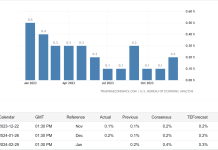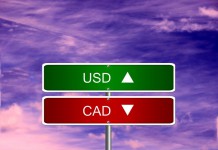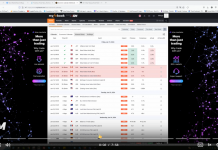 The most important news coming this week from the Eurozone is associated with the European Central Bank (ECB). On Thursday April 26th 2018, the ECB is going to announce its decision on whether it will raise, lower or keep stable its interest rates. The decision is considered important because interest rates are a vital part of every central bank’s monetary policy.
The most important news coming this week from the Eurozone is associated with the European Central Bank (ECB). On Thursday April 26th 2018, the ECB is going to announce its decision on whether it will raise, lower or keep stable its interest rates. The decision is considered important because interest rates are a vital part of every central bank’s monetary policy.
Market analysts expect that the ECB’s governing council will keep the Eurozone’s central bank interest rates unchanged at 0%. Despite the stimulating measures implemented by the ECB, including the quantitative easing (QE) program that is active since 2015, the Euro-bloc’s inflation is still away from the 2% target that has been set. For this reason, the ECB’s governing board is still reluctant to raise borrowing costs, although the US Federal Reserve (Fed) and the Bank of England (BoE) have already proceeded in hiking their benchmark interest rates in the last months.
Analysts forecast the next ECB rate hike
However, analysts from major banks have speculated about the timing point that the Eurozone’s central bank will follow the Fed and the BoE in raising interest rates. Economists from the Nordea Bank AB, one of the largest financial services group based in Scandinavia, wrote in a report, released on April 18th 2018, that the inflation outlook is going to play a key role when the ECB decides to take steps to exit the loose monetary policy of the last 3 years. “We foresee that the ECB’s exit is going to be a gradual process. We expect the ECB to continue asset purchases at a declining pace until the end of the first quarter of 2019 and raise interest rates for the first time towards the end of 2019,” is noted in the report.
On Tuesday April 24th 2018, a report published by Nomura, which is an Asia-headquartered financial services group, showed that its analysts are in line with the consensus in expecting no changes to the ECB’s policy after the governing board meeting. “Indeed, very little new information is likely to emerge, in our view, that could meaningfully shift investors’ expectations about future ECB policy. In the post meeting Q&A session, Mr. Mario Draghi, who is the President of ECB, will likely be asked about the recent trend towards disappointing data. He will probably ascribe this in part to temporary factors such as labour unrest and poor weather,” as stated in the report by Nomura.
The Danske Bank’s research team announced in a report, released on April 20th 2018, that it revised its forecast regarding the ECB’s interest rate hike. The bank’s analysts noted that they expect the next rate hike to be decided in December 2019, much later than June 2019 which had been their previous estimate. The Danske Bank’s economists suggest that the reason for postponing raising borrowing costs is the increased downside risk to growth and inflation, adding that “in our view, a rate hike will come only once inflation is on a self-sustained path towards the 2% target over the medium term.”
STO and the Euro
The Euro to US Dollar, the Euro to British Pound and the Euro to Japanese Yen are just three of the currency pairs you can trade with on the STO platform. STO clients can select from a variety of over 30 currency pairs and plan the suitable trading strategy for them. STO provides traders with daily fundamental and technical analysis that aims to help them reduce the trading risks.
Trading Forex and CFDs, which are leveraged products, are high risk investments and puts your capital at risk. You may sustain a loss of some or all of your invested capital. Only speculate with money you can afford to lose.
















